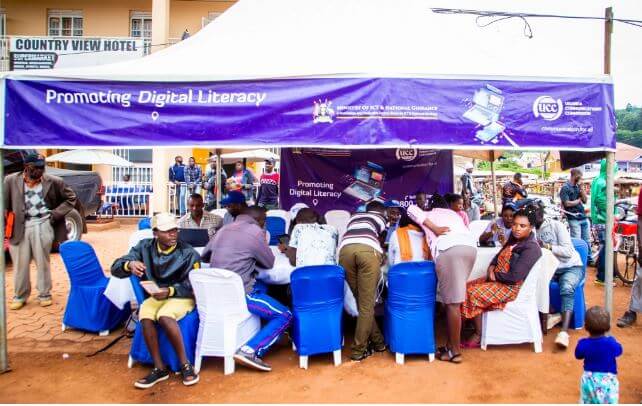
Our Projects are
Transforming African Trade
Quick Contacts
2nd Floor, Fidelity Insurance Centre Waiyaki Way, Westlands

Uganda Communications Commission (UCC) through the Uganda Communications Universal Services and Access Fund (UCUSAF) last week launched a call for proposals on how to enhance ICT adoption through digital literacy for rural border communities.
The successful applicant will partner with UCC/UCUSAF to implement key activities under a general thematic area of addressing the digital divide amongst 12 rural border communities.
The key project action is conducting digital literacy training for up to 2,400 community members (minimum of 200 inhabitants per location) around the border district areas of Kyanika, Oraba, Kagitumba, Mutukula, Vurra, Malaba, Elegu, Bunagana, Busia, Katuna, Mpondwe and Lwakhakha.
The successful partner will also be required to conduct a baseline survey on the use of ICTs in the selected border locations.
Project objectives
Background
According to UCC, COVID-19 and the social distancing measures implemented to curb the spread of the pandemic, including the urgent need to digitalise work, education, and trade, have rendered digital literacy skills more essential. Greater demand for digital services has exposed the digital divide – the uneven access to and distribution of ICTs in communities.
Among the rural population of Uganda, the Commission stated, the adoption of digital skills has previously been left out of public discourse, relegated to the periphery by the disproportional focus on access to rural connectivity.
“However, both the supply side (access) and human development factors (use) are equally crucial, and therefore need to be addressed simultaneously.”
According to a 2019 study on the state of ICT in Uganda, just over one-third (36%) of non-internet users are digitally illiterate, with 23 percent stating that they do not know how to use the internet and 13 percent giving a negative assessment about their need for the internet.
“Therefore, while ICTs have enabled society to evolve towards electronic participation, inclusive online engagement, and global exchange of information, in rural and marginal urban areas of Uganda and other developing countries, the digital literacy levels are still very low,” the study indicates.
As part of the Government’s efforts to bridge the digital divide, the Commission has in the past, through UCUSAF, used the schools’ computer laboratory infrastructure as a platform to provide basic digital literacy skills training to the neighbouring communities.
Up to 4,000 community members were trained through that arrangement in the period 2017/18 to 2019/20.
The Commission also embarked on a countrywide digital literacy campaign with the goal of equipping over one million informal sector operators with the digital literacy skills they need to boost their business processes and improve their daily lives.
In addition, UCC and the Uganda Institute of Information and Communication Technology (UICT) in the FY 2020/21 collaborated in conducting a training of trainers (TOT) programme for five hundred (500) participants.
The participants, who were equipped with basic and intermediate digital skills, as well as trainer skills, later helped to train a further 5,000 community members.
During the COVID-19 lockdowns, UCUSAF undertook some initiatives at border areas – these being some of the most vulnerable locations – including establishing WIFI hotspots for ease of doing business, access to COVID-19 related information, and free internet for the local communities.
Through this call, the Commission is seeking partners to build on these initiatives to extend digital literacy training to rural communities living around the selected 12 border areas.
Requirements
Proposals are expected to meet the following requirements:
The grant applications will be assessed basing on administrative, technical, and financial criteria.
The grant application process is open effective March 11, 2022 to March 25, 2022.
Read original article
Disclaimer: The views and opinions expressed in this article are those of the authors and do not necessarily reflect the official policy or position of TradeMark Africa.